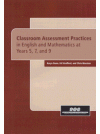This research reports on the assessment practices of teachers in New Zealand classrooms including:
- the assessment tools and strategies that are being used
- why particular assessments are used
- which assessments teachers find most useful.
While teachers use a variety of assessment tools and strategies as a basis for:
- informing future teaching
- monitoring students' progress
- reporting to parents.
they show a clear preference for teacher- or school-developed strategies for assisting the teaching and learning process.
This study provides valuable baseline data which will allow changes in teachers' assessment practices to be tracked over time. The data will also be useful for identifying the kinds of support that teachers need to help improve their assessment practices.
Purpose
1. What assessments are being used in the areas of English and mathematics at Years 5, 7, and 9?
The research comments on issues such as what assessments are actually being used in classrooms, frequency of use, how much assessment is externally developed, as opposed to teacher or school developed, and what information is recorded.
2. Why are the assessments undertaken?
Here the research examines the purpose for which each assessment is used, whether any feedback is received about the assessment results, and if there are any required assessments that would not be used if the teacher was given the choice.
3. Which assessments are the most useful?
The research investigates how useful each assessment is seen to be for a variety of purposes, and where the perceived gaps in assessment are.

